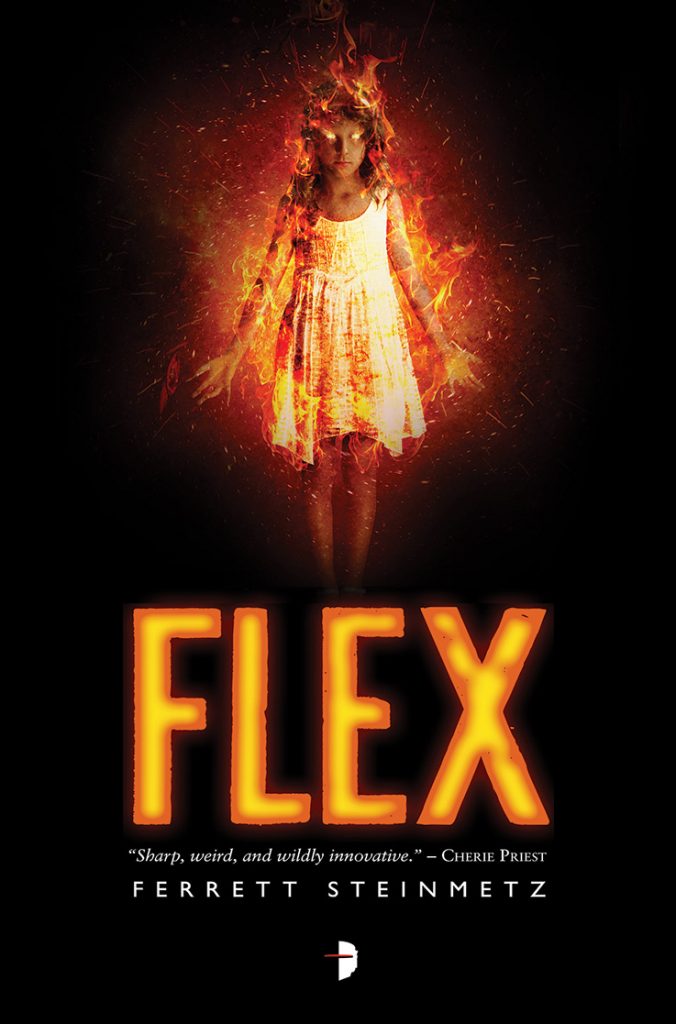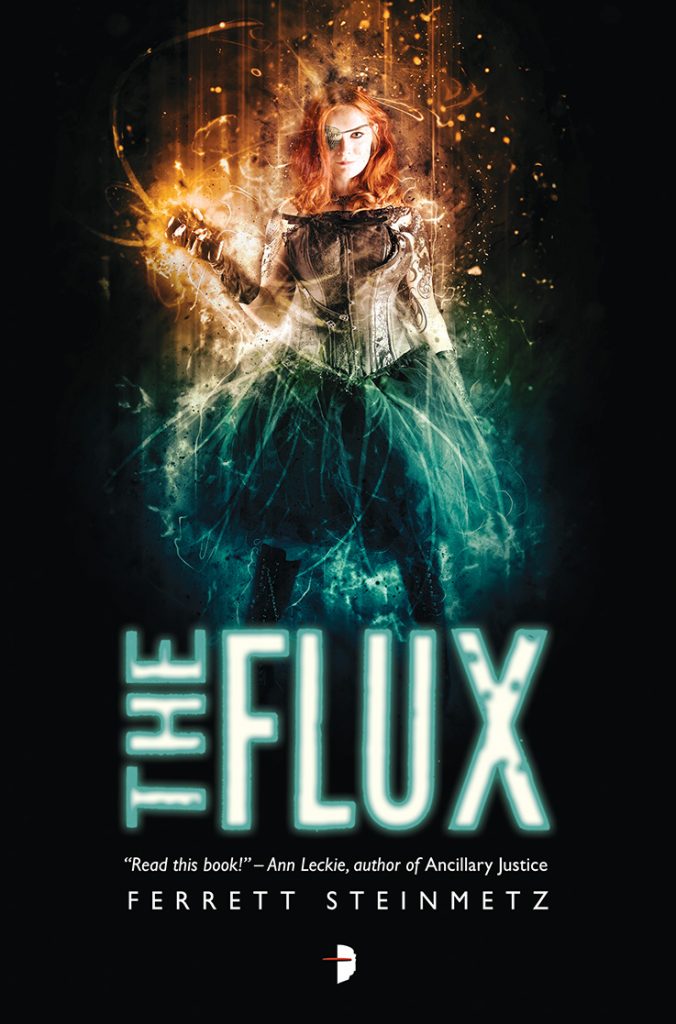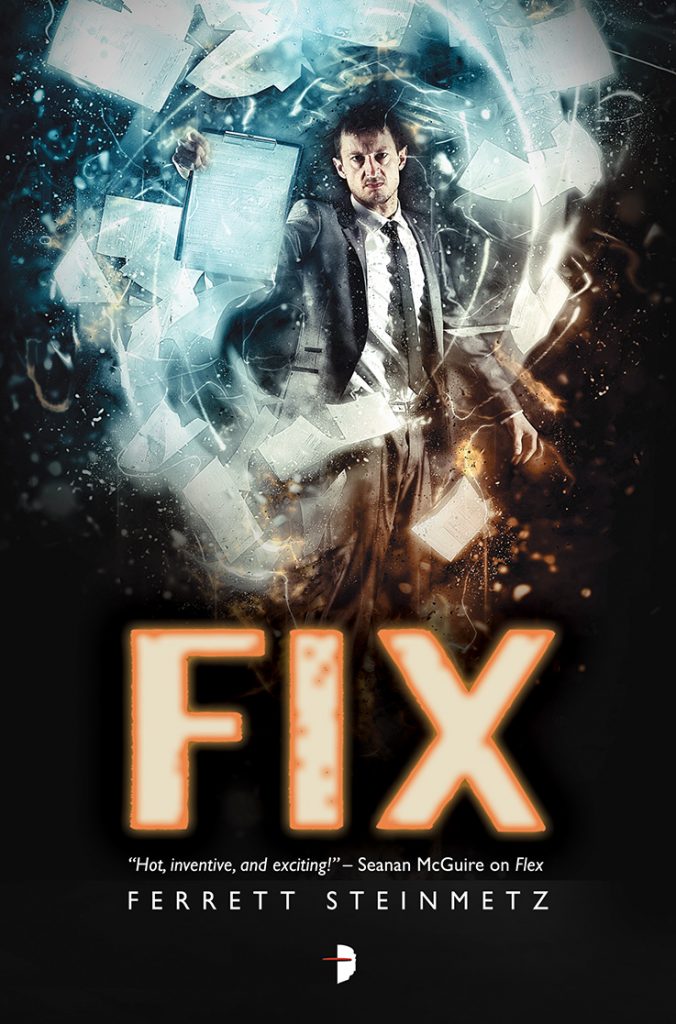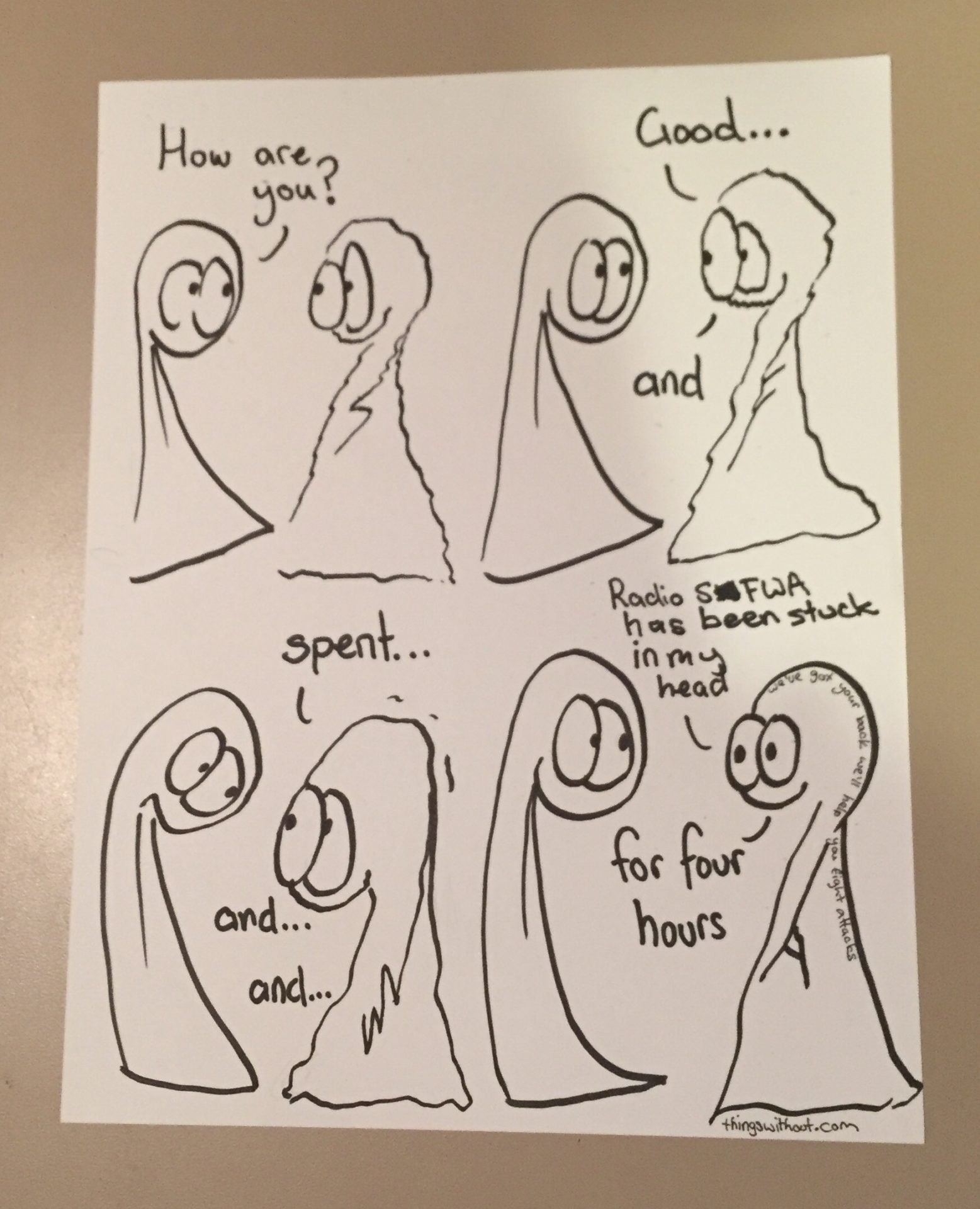aka Hound of the Basket Cases
In today’s roundup: Suw Charman-Anderson, John C. Wright, Tom Knighton, Vox Day, Lela E. Buis, R. K. Modena, Jason Cordova, Samuel Edwards, Solarbird, Peter Grant, Dr. Mauser, T.C. McCarthy, Chris Meadows, John ONeill, Annalee Newirtz, Rachel Swirsky, Ferret Steinmetz, Brian Niemeier, Jim Butcher, George R.R. Martin, Matt Wallace, John Scalzi, Nick Mamatas, Paul Anthony Shortt, Rick Wright, David Gerrold, Quilly Mammoth, Spacefaring Kitten, Lis Carey, Andrew Hickey, Rebekah Golden, Adam-Troy Castro. (Title credit goes to File 770 contributing editors of the day Ryan H and Troutwaxer.)
Suw Charman-Anderson on Strange Attractor
“How Tor failed Social Media 101” – June 10
- Take enough time, but not too much or too little
When the shit hits the social media fan, it is important to respond in a timely manner, but it’s even more important to avoid a kneejerk reaction. If an issue needs further inquiry before a full response is issued, then it’s acceptable to publicly acknowledge the complaint and say that it’s being looked into.
It may even be that no response is required – not every complaint is deserving of employer intervention. If an employee has a disagreement with a member of the public on her own Facebook page, it is possible that her apology on said Facebook page is sufficient, and that her employer need not step in at all. One can debate whether that was the case here or not, but it is an option that should have been considered, along with all others.
Doherty’s response reads very much like a kneejerk reaction. it is, to all intents and purposes, a public disciplining of Gallo, which is entirely inappropriate no matter what Gallo did. If you address a complaint, you do not use it as an opportunity to shame your staff. Doherty should have taken more time to think about exactly what was going on and how his post would be read by the broader Tor community.
- Remember there are three sides to every argument
Any public response to a public complaint is made more complex by the fact that there are three parties involved: You, them, and the audience. In his rush to appease Gallo’s critics, Doherty appears to have forgotten that he might also anger people who agree or sympathise with Gallo, or who do not believe that the complaint against her has merit, or who, after reading his post, believe that the complaint has merit but that his response was inappropriate, etc.
In chastising Gallo online, Doherty has alienated a lot of people, and that in and of itself is a massive failure for Tor that Doherty himself should be disciplined for. You simply do not rush in with a response that inflames the situation, especially when it’s obvious from the beginning that tempers are running high and offence is being easily taken. Indeed, the taking of offence is a key weapon in grievance politics, and Doherty should have both realised there was a major risk that his response as written might make the situation worse rather than better.
John C. Wright
“Honor is Satisfied” – June 10
A reader asked what I meant when I said, that as a matter of formality, Irene Gallo’s pro forma and possibly insincere apology for her pro-forma and possibly insincerely insult satisfied my sense of honor.
It is difficult for me to explain something that is second nature to me, which is alien to the modern world at every point. In the military, the soldier is obligated to salute the uniform wore by officers of higher rank, not the man wearing it, and the man wearing it is obligated to behave as the uniform requires. The salute satisfies the formality.
An apology satisfies the demand for apology; if the person proffer it did so with deceptive intent, God Almighty, who sees and knows the hearts of the sinners, will punish the falsehood with penalties nightmarish, vehement, absolute, and infinite, that my heart quails to contemplate them. I cannot burn a disembodied soul in hell forever, and neither can I read minds and hearts. Hence, I am not in a position judge the sincerity of an apology, nor do I have the least desire to do so….
I, for one, will regret the event, since a woman of such superlative skill will be hard to replace, but I am confident that Mr Doherty will not insist on keeping her at her tasks in the face of her own shame and regret.
How could she, in good conscience, design a book cover for authors she has so bitterly, absurdly and erratically libeled, and proffer it to book buyers for whom she equally has shone such scorn and mind-destroying hate? It would be cruel of Mr Doherty to insist on Irene Gallo continuing to labor under such adverse and unhappy conditions.
Tom Knighton
“Note to my fellow Sad Puppies: Chill just a bit” – June 10
You see, her job isn’t necessarily secure. She issued an apology of sorts, probably because she was told to. A post was made at Tor.com distancing her employer from her comments. That may look like all there will be, but that’s not necessarily the case. All of that could just be the initial stages of crisis management that may or may not result in her termination.
And if not, I’m still going to ask folks to pull an Elsa and “Let it go”. I’m not saying to accept the apology. I’m not saying to forgive Gallo. That’s up to each and every individual to decide for themselves. Instead, I’m saying to just let it go and move on. Gallo’s opinions have been noted, and those who work with her in the future may wish to ask if there is someone else they could work with instead. Or not.
Folks, we need to be reasonable here. Yes, we were grievously insulted. Even if you blow off the “neo-nazi” comment, what followed was little better. However, she wasn’t the first to use those terms. Unfortunately, I suspect she won’t be the last either.
Unlike many others, she apparently got a stern lesson about such things. We got a post that admits that yes, the Puppies did include women and people of color (I hate that term. Sounds too much like “colored people” for me to be comfortable writing it) as well as Tor authors. I suspect that Irene Gallo will be much more careful going forward.
Vox Day on Vox Popoli
“Peter Grant issues a second warning” – June 10
The Evil Legion of Evil has not yet called for a boycott by the many Tor customers attacked by Ms Gallo. It has, after all, only been two days since the management at Tor Books learned about her attack on them. But the one thing they must understand is that an apology is not enough. We expect a resignation. Sooner or later, Ms Gallo will resign. It’s only a question of how much damage Tor Books, and perhaps more importantly, Macmillan, are willing to take first.
Lela E. Buis
“A word about power structures” – June 10
One of the problems with social justice attacks in general, and the recent Sad Puppy/Rabid Puppy challenge specifically, is that the rants are often mis-aimed. This means they cause hard feelings, and of course, set off nasty flame wars.
Social justice endeavors can have different motivations. For one, the writer is inflamed by something s/he sees and is motivated to climb on a soapbox for a cathartic, fist-shaking rant. For another, the writer is affronted by some injustice and sits down to plan out a calculated crusade against the problem. In either of these cases, the SJW may have a closely held belief or value that trips off the attack. S/he is hoping it will make people mad and therefore lead to some discussion
R. K. Modena on Shadowdancer Studios
“Nazi is not a term you throw around lightly” – June 10
This is why I prefaced this post with a history of who I am, and a rather summarized description of my experiences. I have faced real racism, real discrimination. I have stood OPENLY in support of the Jews, of Israel, for which I have been stalked by someone on the side of the Antis FOR NEARLY SEVEN YEARS AND RECEIVED THREATS AGAINST MY CHILDREN FOR.
Peter Grant has fought against it.
Brad Torgersen goes to fight ISIS / DAESH – against REAL terrorists, REAL religiously motivated hatred, REAL rape culture, REAL KILLINGS OF GAYS.
You who sling mud at us, who question our honor our integrity, our hardships and experiences are doing so FOR THE PETTY REASON OF AN AWARD FOR FICTION.
With Irene Gallo’s original response to the protests of her words, and her subsequent non-apology, it is clear she is unrepentant in her contempt, in her hatred.
Janet on Dear Author
“Wednesday News: Tor v. Irene Gallo, Warner Bros. v Friends fans,…” – June 10
So Irene Gallo, creative director and associate publisher for Tor, made a strongly worded comment about the Sad and Rabid Puppies on her personal Facebook page. Afterward, she clarified that the comment was personal and not said in her capacity as a Tor employee. The Sad/Rabid Puppies got mad and then loud about it. Which resulted in Tor publisher Tom Doherty publicly condemning Gallo and basically apologizing to the Sad and Rabid Puppies. I figure the fact that I agree with Chuck Wendig on this is an indication of how gross this situation really is.
Jason Cordova
“Eric Flint and the Sad Puppy” – June 10
I’m glad that Eric [Flint] took Tor editor Irene Gallo to task for calling Sad Puppies neonazis. That’s probably the one and only insult that really, really pisses me off. I can stand being called everything else, but once you go past petty and into full-blown turnip with your insults, then I get angry.
Seriously. Ask around. I’ve kind of teetered between confusion and amusement at all this. Confusion because I’m still trying to figure out how I’m a misogynistic racist whose homophobic tendencies override rhyme and reason. Amusement because the amount of bullshit one would have to peddle to make any of that true could fuel a mission to Mars.
But at this point I don’t think it matters. This is the Internet. People don’t take a step back and think “Holy hell, what the **** am I saying?” very often. More often than not a person will double down and keep flinging poo. I’m guilty of it as much as the next I suppose.
Samuel Edwards at On Fairy Stories
“Irene Gallo and Boycotting TOR” – June 10
What saddens me the most is reading John C. Wright’s post about Irene Gallo. John C. Wright, a self-professed Sad Puppy, has worked with Irene Gallo at TOR. John is published by TOR and some of his covers were the result of Irene Gallo’s work. That she would be so quick to ascribe falsehoods to the Sad Puppies (and by extension, John) is befuddling. She referred to works which she had a hand in producing (albeit a cover) as ‘bad to reprehensible’. To me, it sounds like she’s been drinking too much of the SJW koolaid. Not only is John published by TOR, but so are other Puppy nominations such as Kevin J. Anderson. This kind of disrespect towards your employer wouldn’t stand in most other companies.
Solarbird on crime and the forces of evil
co-signed, strong letter to follow – June 10
I have raged about this so many times. When I was a software developer, I literally sidetracked my career so that I could spend quite literally another full-time job’s worth of time fighting against groups trying to make me illegal. And by illegal, I mean fucking illegal, as in direct threat to my life and freedom, by design. That was the intent and goal, so it’s not like I had any sort of goddamn options.
When I talk about spending “blood and treasure” on this, the blood comes from the street assaults, the treasure comes, in part, from this. All that lost time and money, fighting off people who not only enjoyed but actively made a living from trying to make my existence illegal.
And just as much, the people trying to make me and people like me at best into sub-citizens and at worst into dead people? They enjoyed their work, and made money at it.
Just like the Puppies enjoy their bullshit. They’re having a great time.
Peter Grant on Bayou Renaissance Man
“The Tor imbroglio and the progressive narrative” – June 10
Notice how the commenters cited above [at Tor.com] aren’t addressing the specifics of what Ms. Gallo said – they’re saying that she’s right regardless of those specifics, because of other, often extraneous factors. “My mind’s made up. Don’t confuse me with the facts!” They also freely insult others, regardless of the fact that they would never accept or tolerate the same insults being directed against them. To call anyone a ‘sub-human piece of filth’, as quoted above, is barbaric . . . yet some of them revel in that sort of thing. That says far more about them than it does about the person they’re accusing.
Another favorite tactic of such individuals is to ignore the overall thrust of the problem by nit-picking the details to death. If someone makes an allegation of a pattern of misconduct, they respond by taking every single element of the allegation, separating it from the others and nickel-and-diming it to death, demanding verification, supporting evidence, etc. They can (and do) spin out the process in such depth and for so long that others lose patience and walk away . . . whereupon they claim victory because the original allegation “has not been proved” (to their satisfaction, anyway).
Dr. Mauser on Shoplifting in the Marketplace of Ideas
“The Elements of an Apology” – June 10
Apparently, in this day and age, people have forgotten how to properly apologize for their misdeeds. We now live in an era where Ego and Hubris have reached the point that offense is not an objective thing, but in the eye of the offended, who CLEARLY must be delusional, since we can all do no wrong. Well, others can do wrong, and when they do, they MUST be compelled to make an apology. But since they are subject to this same attitude, they only mouth the words that will get other people off their backs.
This leads to a lot of shitty non-apologies that never accomplish what a public apology is meant to do, which is serve as a form of social correction for doing wrong.
There are four things that an apology should contain….
Chris Meadows on TeleRead
“Sad Puppies roundup, and the Irene Gallo controversy” – June 10
Personally, I’m rather surprised Tor.com left the comments open on Doherty’s statement at all. Usually whenever Tor.com posts something even remotely likely to be controversial (such as statements from Macmillan chief John Sargent in the agency pricing/anti-trust days), it keeps comments firmly closed. It makes me wonder if it might have been done as a passive act of protest against a mandate coming down from Tor’s parent company Macmillan, or perhaps even their corporate owner Holtzbrinck, that Doherty had to issue such a statement. (It wouldn’t be the first time Tor was subject to corporate interference.) But I could be reading too much into it.
Some Puppy supporters, such as Cedar Sanderson and Amanda Green, feel Gallo’s apology didn’t go far enough. On the other side, Chuck Wendig, Gawker, and The Mary Sue have excoriated Tor and Doherty for capitulating. Kameron Hurley, author of the book Gallo’s post originally concerned, has a few comments as well, and The Daily Dot has a good roundup of some of the social media reactions to the affair.
Regardless, it has certainly given rise to a great deal of sound and fury, signifying…well, not a whole lot. Puppies supporters and opponents have both had ample opportunity to show more of their true colors, each providing more ammunition that the other side can use to say, “See? See what they are?” It hasn’t brought us any closer to universal Hugo harmony. But then, we’re probably never going to have that again, at least not for a good long while.
John ONeill on Black Gate
“Internet Explodes Around Irene Gallo” – June 10
If you’ve been following science fiction publishing for the past 48 hours, you may have found yourself asking, “Who the heck is Irene Gallo?”
The talented Ms Gallo is the Creative Director of Tor Books, and the associate publisher of the marvelous Tor.com, where she’s done some exemplary work. On May 11, in response to a question on her personal Facebook page, she wrote a quick and rather clueless assessment of the Sad Puppies/Rabid Puppies movement:…
David Gerrold on Facebook – June 10
Apparently, there is no mistake so insignifcant that it does not deserve a call to action by the outrage committee. Torches, pitchforks, tar and feathers. Even the smallest of sins must be punished by an internet pile-on, public shaming, and boycotts of everyone in the same neighborhood.
Is there anybody who has not yet earned their Drama Queen merit badge? I guess not. We keep stirring this can of worms to make sure the sauce gets evenly distributed.
The only winner in this (so far) is a certain lunatic attention-whore who needs to demonstrate how important he is by the size of the uproar he can create. And the rest of us have bought into it.
There was a Star Trek episode, “The Day Of The Dove” — in which the crew of the Enterprise and several Klingon warriors were at each other’s throats until they realized that there was an energy creature aboard, feeding on their hatred. Eventually both sides laughed at it — “We don’t need your help hating each other.”
We can continue to rip apart our community and eventually both sides will claim some kind of exhausted victory over whatever shambles remain. The grudges and feuds will last at least a generation because being right has become more important than being friends or colleagues.
https://twitter.com/Annaleen/status/608437763160047616
[If the link doesn’t work — http://www.ericflint.net/index.php/2015/06/08/in-defense-of-the-sad-puppies/comment-page-2/#comment-2591662 ]
I don’t know if Ms. Gallo’s apology was sincere or insincere.
I don’t know that, because I can’t read her freaking mind.
And neither, presumably, can anyone else.
I work with words professionally. I know exactly how powerful they can be. I am also well aware of their limits–and when it comes to expression complex thoughts in emotionally tense situations over the goddamned internet, the magic of written language has little power.
How can it? It’s missing too much. You can’t read tone of voice, or the expression on a person’s face when they’re making keys click. Pretty much all you get is “clickity click click.”
I’m also an English major. So I’m very aware of how skilled human beings can be at reading all kinds of absolute horse manure into other people’s writing, and then declaring it “subtext” or “internally consistent logic.”
But it isn’t. It’s you, guessing. And your guess is probably prejudiced to one degree or another, most often by projecting things into it that were never meant to be there. Or, put another way:
http://weknowmemes.com/wp-content/uploads/2012/06/what-the-author-meant.jpg
Maybe Ms. Gallo wrote the apology with a smirk and a cigarette hanging off of one lip while reciting nasty twitter quotes at every individual member of Science Fiction Fandom. Or maybe she was crying and upset and genuinely trying to make amends. Or maybe she was just numb and exhausted. I don’t know.
Neither do you. That’s kind of my point.
But maybe it’s simplest if the curtains were fucking blue, we take her words at face value, and extend a bit of human courtesy and trust to a fellow science fiction nerd. Because she is one, whether that pleases you or not.
Deep breaths here, guys. Her comment was out of line and made a lot of people upset. She apologized to those people.
The curtains were fucking blue.
Can we just get on with life, please?
George R.R. Martin on Not A Blog
“Wars, Woes, Work” – June 10
I want to single out the postings of Eric Flint. The latest, at http://www.ericflint.net/index.php/2015/06/09/a-response-to-brad-torgersen/ , is a devastating point-by-point deconstruction and refutation of the latest round of Puppystuff from Brad Torgersen. Flint says what I would have said, if I had the time or the energy, but he says it better than I ever could. ((I will be nominating him for a Hugo too. For Best Fan Writer)). His earlier posts on Puppygate are all worth reading too. He is a voice of reason in a sea of venom.
I will add one point. The emptiness of the Puppy arguments is indicated clearly by how much time they seem to spend in coming up with new insulting terms for those who oppose them. The facts are against them, logic is against them, history is against them, so they go for sneers and mocking names. First it was SJWs. Then CHORFs. The latest is “Puppy-kickers.” Next week, no doubt, they will have something else. Reading all the blogs and comments that Glyer links to from FILE 770 has convinced me that anyone who starts throwing these terms around can pretty much be discounted; you will find no sense in what they say, only sneers and talking points….
Yes, I know that THE HOLLYWOOD REPORTER named me “the third most powerful writer in Hollywood” last December. You would be surprised at how little that means. I cannot control what anyone else says or does, or make them stop saying or doing it, be it on the fannish or professional fronts. What I can control is what happens in my books, so I am going to return to that chapter I’ve been writing on THE WINDS OF WINTER now, thank you very much.
Matt Wallace
“When We Drive out the Innovators We Are Left Only with the Sad and Rabid” – June 9
I don’t know how you feel about what she wrote about the Puppies and I don’t really give a shit. What is not open for debate is the fact Irene has helped and is helping innovate a major appendage of a major publisher and is one among several pairs of hands shaping a better, more interesting, more diverse future for authors and readers of SFF. That is not only needed, it is necessary. It is absolutely vital. She should be elevated for that, not sacrificed to a small clan of mediocre throwbacks because they can be the most vocal on the fucking internet.
Tor’s position on this, among myriad other ways that position is f’ed up, is one of trading innovation and a wider audience for the utterly narrow; a narrow viewpoint expressed by a narrow demographic of the narrow-minded.
The Puppies keep saying they want change, but what they want is things to go back to the way they were.
That’s what really pisses them off so much.
They want things to stay the same.
They don’t want change.
That excludes folks like Irene Gallo, who are literally changing everything for the better.
And in what creatively-driven industry or form has not changing ever been a good thing?
From a strictly business standpoint, she is worth more than a few hundred anonymous user names in a website comments thread will ever be. Alienating your company’s innovators is simply bad business. From a creative standpoint, her involvement is vital to the future of SFF and SFF publishing.
From a human standpoint, Irene simply deserved better.
Much better.
But my opinions are selfish. I want to be part of the future, not the past. I want to be part of a publisher that innovates and spreads my stories to new corners of the internet AND the world of the real. I want to be part of something new, something exciting, something great.
Irene Gallo is taking me and the rest of the Tor.com authors there, the same way she’s helped so many Tor authors in the past.
I need her.
Treat her the fuck better.
That is all.
John Scalzi on Whatever
“A Refresher Course On What I’m Obliged to Write About” – June 10
- The Internet doesn’t need me to weigh in on everything. It certainly didn’t in this case — there were more than enough people willing to engage both Irene’s initial comment, and Tor’s letter about it and the aftermath. In the former case, here’s something by Eric Flint; in the latter cases, something by Kameron Hurley and Chuck Wendig. These three are the figurative tip of an iceberg comprised of blog entries, comments, tweets and Facebook posts.
The Internet did not wait for me on this; it doesn’t wait for me on anything. Why are you waiting for me? I mean, thanks, I guess? It’s nice you want to know what I think? But I do hope you recognize the difference between you having an interest in my public thoughts on something — which is great! Thanks! — and thinking I’m obliged to share my thoughts on something in a public manner — which is not great, and which I don’t agree with.
Nick Mamatas
“Why Can’t Publishers Make Writers Behave?” – June 10
[This is the closing section of a detailed and informative article.]
Push too far, too hard, too often, and a publisher may just find its headcount is much larger than it believed. And even if not, the publisher still gets to experience the annoyance and hassle of an investigation. If a publisher wants to play the game of “You’ll never eat lunch in this town again!” in public or even in writing, that could lead to the freelancer, do-this-or-you-are-fired email in hand, giving the unemployment-filing trick a whirl.
This is one reason why all those tweets and emails and blog-comment huffing about a publisher doing something or at least saying something about that nasty, awful person whose books they publish are almost never going to get any kind of public hey-there-this-is-evidence response from a publisher.
There are other reasons too—awful people, up to and including criminals and the more blood-soaked breed of politician, write books all the time. There’s a massive tradition of carceral literature in existence. If you’ve attended college, you almost certainly read the writing of some criminals, or even material that was written inside prisons. Don’t think that awful blog posts or sneakity-doo trickery on the Internet will faze many publishers. Think of James Frey, who lied to millions of people, who had to settle a lawsuit because his memoir was wall-to-wall lies, and who was yelled at by Oprah (patron saint of nice people) on her show. Where did he end up? At the head of his own YA fiction sweatshop, and getting movies made from “his” stuff.
Publishing just ain’t about “nice” when it comes to its writers, and that is true in both how it treats writers, and what it can expect from writers.
Paul Anthony Shortt
“Tor Books, Inclusiveness Does Not Mean Permitting Prejudice” – June 10
There is an erroneous thought drifting in the wind. This thought tells us that, in order to be truly inclusive, we must not only accept that there are people whose opinions are abhorrent to us, not only allow them to have such thoughts, but also grant them a stage for their thoughts, even if we’re the ones who own the stage. More so, we’re told that it’s our responsibility, as fair, inclusive people, to even sit and listen while these attitudes are shoved in our faces. We’re told me must defend these people from any critic. Not from people trying to stop them, mind, but from people disagreeing with them. When you champion those who would close doors and hoard their power, you are not being inclusive.
When you defend those who rail and abuse minorities from having their opinions challenged, on the grounds of “free speech”, you are not being inclusive. When you shame a woman before the entire world, using your position as a bastion of your industry to reach your audience, just because she had the courage to come out and hold prejudice up for what it is, you are not being inclusive.
Shame on Tom Doherty. He has shown his company as promoting an environment where those who speak up against that which is wrong will be punished.
Rick Wright on Mangy Dog
“Morning coffee 2015-06-10 – Jude and Christianized America” – June 10
I went on record (not for the first time) as saying we should not call for Gallo to be fired. Someone disagreed and explained why. I stand by my original position. Just because some teacher or journalist or publisher says something insulting or offensive does not mean we should always want that person to lose her/his job. Disciplined? Sure. Consequences? Probably. But not fired. Not except in the most extreme cases. This is a simple matter of Treat Others As We Would Like Them To Treat Us. If we are sick and tired of conservative or traditional Christians (or whatever) losing their jobs because they express an opinion at odds with the current Zeitgeist then we should not return the disfavor yes?
David Gerrold on Facebook – June 10
I have begun filling out my Hugo ballot. There were two categories where I voted for individuals who were on the sad puppy slate — because regardless of the slate-mongering, I felt their work was award-worthy. They deserved to be on the ballot.
This is consistent with what I have been saying all along. Read the stories, vote your conscience.
Andrew Hickey on Sci-Ence! Justice Leak!
“Hugo Blogging ‘Best’ Fan Writer” – June 10
And so once again I dip into the sewer. The “Best” Fan Writer category in the Hugos is apparently meant to encourage SF fans to write about SF. This year, it seems to be largely made up of people who claim to be professional writers, but who can’t string a sentence together.
Spacefaring Kitten on Spacefaring Extradimensional Happy Kittens
“On Time” – June 10
Agenda-setting-wise, they have been very successful, though. Most of the fans who are critical of Sad Puppies (lets call them Happy Kittens for short) have been diverted to waste their precious time and energy on refuting what badly thought out garbage some Rabid or Sad Puppy managed to spit out. Most likely the garbage in question was highly illogical and the Happy Kitten in question had little trouble with demonstrating that.
But the fact is, Happy Kitten energies were wasted on fighting a culture war on a battleground selected by the opposing side when they could instead have been reading, writing, buying, enjoying and celebrating some first rate SFF. The Puppies are opposed to SFF that is diverse or deals with gender or political issues or is technically ambitious. I think there’s a lot that Happy Kittens can do for that sort of SFF, apart from engaging in a debate where nobody is really going to change their views.
Rebekah Golden
“2015 Hugo Awards Best Fan Writer: Reviewing A S Green” – June 10
All of [Amanda S.] Green’s post are very well written. Except for the excessive use of acronyms which obviously speak to an in group her writing is very clear.
Only one of the posts she submitted seems to have anything to do with sci-fi/fantasy fandom and that is the one on Star Trek canon. The other two posts have to do with feminism and society in general and maybe conference attendance. Again, I’m looking for someone who is positively enthusiastic about something sci-fi/fantasy related, deep in the details and sharing the love. That is what I am looking for to give someone the label of best fan writer.
Lis Carey on Lis Carey’s Library
“Best Professional Artist Hugo Nominees” – June 10
Carter Reid: No. Sorry, no. I feel no hesitation in saying that Reid’s art is just not very good.
Nick Greenwood: I’m sorry, no, these just do not work for me. No one should take this as a criticism of their taste; in this area, I have none.
Alan Pollack: Very nice work, but they don’t move me much beyond “very nice.”
Julie Dillon: Very lovely work, that I’d like to see more of.
Kirk DouPonce: This is also lovely work, that I’m pretty sure would make me reach for the book. That’s one of the main purposes of commercial art, right? But not the only purpose of professional science fiction and fantasy art. I’ll have to give serious thought to the choice between DouPonce and Dillon.
Font Folly
“Hugo Ballot Reviews: Novellete” – June 10
“The Day the World Turned Upside Down,” by Thomas Olde Heuvelt, translated by Lia Belt. This story was a delight! I was sucked into its very surreal premise immediately. Inexplicably, gravity reverses… at least for solid objects—people, cars, grocery bags, you name it—suddenly start falling into the sky. That this happens shortly after the protagonist is dumped by his girlfriend makes you wonder, for a while, whether or not this is all happening in the protagonist’s head, but I was soon so caught up in is quixotic adventure to somehow keep her pet goldfish alive, transport it to her (by clinging to objects fixed to the ground, and so forth), and effect her rescue.
The misadventures that follow, in which (among other things) the narrator rescues a child clinging to a swing set who longs for her mother who fell into the sky, all slowly build to a climax that is sad, poignant, yet completely fitting. It’s that magical sort of ending that you occasionally encounter where it isn’t what you expected, yet once you reach it, it seems inevitable and the only possible way it could end.
I really, really liked this story! And having read it, I was filled with a renewed hope for the rest of the novellas!
Adam-Troy Castro
“Your Approved Safe Story” – June 9
Welcome to your approved safe story.
In this safe story, the characters are guaranteed likeable.
They are guaranteed to make all the most admirable decisions.
Nothing bad happens to them.
Nothing bad is done by them.
There is no evil in the world around them.
They are presented with minor obstacles that challenge them in no way.
Everybody respects everybody else.
Everybody deserves respect from everybody else.
Everybody is enlightened.
You will not have to disapprove of anything they do or say.
Your opinions will not be challenged by anything they do or so…..













